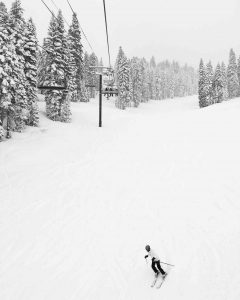 In early March, a video was released showing a 5-year-old dangling from a chairlift at Bear Mountain Ski Resort. The young child slipped from the chairlift shortly after it started moving. The child’s ski instructor caught her by her hoodie. During the time she was dangling from the lift, the child was choked by her the hoodie and her helmet. Thankfully, the young girl was able to safely drop to a tarp. She suffered bruising to her neck.
In early March, a video was released showing a 5-year-old dangling from a chairlift at Bear Mountain Ski Resort. The young child slipped from the chairlift shortly after it started moving. The child’s ski instructor caught her by her hoodie. During the time she was dangling from the lift, the child was choked by her the hoodie and her helmet. Thankfully, the young girl was able to safely drop to a tarp. She suffered bruising to her neck.
From initial reports, it appears at least two things went wrong. The night before, rain in the area froze, causing ice on the equipment. The child’s parents believe the lifts were not properly cleaned in the morning before being put to use. Also, when the child, her sibling, and the instructor got on the chairlift, the safety bar was not brought down. Bear Mountain officials are investigating the accident to determine what went wrong and how to prevent similar occurrences.
Ski Resorts are Not Liable for All Injuries
There are many cases in which ski resorts and other types of entertainment facilities are not responsible for patrons’ injuries. For skiing and snowboarding, in particular, there are inherent risks. People who choose to ski or snowboard may get hurt. It could be purely accidental, it could be because of another person’s carelessness, or it could be the patron’s own negligence that causes the injuries. Ski resorts are typically not responsible for injuries that result from the inherent risks of the sport and can reasonably be expected to occur from time to time.
When a Ski Resort May be Liable
There are instances in which ski resorts may be held responsible for an injury. This is when the ski resort’s negligence leads to an injury that was not the result of an inherent risk of the sport. Ski resorts have a duty, under premises liability law, to maintain the property in a reasonably safe condition for their patrons. The areas where the patrons ski, snowboard, walk, and eat should all be safe to prevent accidents and injuries, including the chairlifts.
If there is evidence that the ski resort, through its employees or management personnel, failed to maintain their duty of care to guests, and their carelessness or recklessness caused an accident, then the victim of that accident may be entitled to compensation.
Waivers Reduce Ski Resort’s Liability
However, there is another factor than just the ski resorts negligence. When individuals purchase entry into a sky resort, they physically sign or implicitly agree to a waiver. This is often printed on the back of a ticket. The waiver is a contract that typically states the ski resort is not responsible for a patron’s injuries. These liability waivers are often upheld by California courts, particularly in regard to a ski resort’s negligence maintenance of equipment.
Whether or not the family from Bear Mountain Ski Resort has a legal claim depends on a number of factors, including whether there is evidence the ski resort was negligence and whether a liability waiver is enforceable, protecting the ski resort from a lawsuit.
Were You Injured at a California Ski Resort?
If you or your child were injured at a ski resort, you should speak with a San Francisco personal injury attorney regarding your legal rights and options. Entertainment and sports venues like ski resorts take many steps to protect themselves from liability. However, when something goes terribly wrong, the resort may be responsible. They are not entirely immune from legal liability.
To learn more, contact Brod Law Firm online or call (800) 427-7020 to schedule a free consultation
(image courtesy of David Klein)
 San Francisco Injury Lawyer Blog
San Francisco Injury Lawyer Blog

